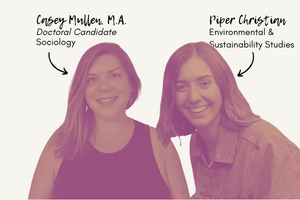CSBS Students work together to tackle
poor air quality in Utah

Sociology Doctoral candidate Casey Mullen and Environmental Studies undergraduate Piper Christian have taken huge strides this year in their journey towards environmental justice. Mullen currently serves as the Air Quality Research Projects Lead for the SPARC Environmental Justice Lab and Christian serves as the Community Engaged Learning Coordinator.
Due to the unique geographic nature of the Salt Lake Valley, particulate matter and other pollutants can become trapped in the air during the winter months causing a significant decline in air quality. This decline disproportionately impacts some areas, often leaving low-income communities of color most vulnerable.
In response to this environmental challenge, Mullen integrated resources across many departments and colleges to educate communities on how to monitor the air quality in their homes. Her project, titled the "Lego Sensor Project", collaborates with a number of campus partners including Dr. Adrienne Cachelin's Environmental Justice course, Project H.A.P.P.I.E.S.T., and Chemical Engineering Professors Drs. Kelly Kerry and Anthony Butterfield. Drs. Kerry and Butterfield created and dispersed air quality sensors called AirU which provide near real-time air quality estimates through a publicly accessible website.
The Lego Sensor Project takes education directly to the classrooms. Mullen takes groups of environmental justice students to 6th graders to teach them how to monitor air quality, building prototypes of air quality sensors using legos.
“We discuss air quality and air quality monitoring, and work with students to build air quality sensors with Lego Building Blocks. The educational lesson and materials were developed by the Department of Chemical Engineering’s Dr. Anthony Butterfield and his students” notes Mullen.
Mullen has found “sharing information about the network of sensors, their air quality data, and building Lego Sensors with students (both university and elementary) from the Salt Lake community is important because it not only enhances understanding about air pollution and how air quality monitoring can be useful to all of us, it also engages students as citizen scientists and exposes them to STEM in a fun and meaningful way!”
Last year Christian worked as an Undergraduate Research Assistant on Mullen’s doctoral research, which provided low-cost air quality sensors to families with asthmatic children.
“Many of the families we worked with expressed interest in improving air quality in their homes,” Christian shares, “so we researched affordable ways to clean indoor air and learned about the DIY Air purifiers as an option”.
With this idea, they received SCIF grant funding for their project titled “Air Quality Sensing, Outreach, and Pollution Resilience at the Glendale Library” to provide air quality sensors and materials to make low-cost DIY purifiers community members at the Glendale Library. Christian explains the “GIS analysis conducted by Casey found that there are socio-spatial inequities in the distribution of air quality sensors in Salt Lake County, with very few sensors in the Glendale neighborhood.”
Mullen and Christian are not slowing down. Christian and her team will attend more community events this spring, such as the Environmental and You event at the Day-Riverside Library in Rose Park. For Christian, clean air is more than an environmental issue. “I grew up in Logan, Utah, which was ranked among the top ten worst cities in the country for short-term air pollution. In elementary school, I remember being held indoors during recess because the pollution levels were unsafe. Everyone deserves access to clean air, and I'm excited to work towards that goal.”
click here to learn how to build your own air filter
About the Blog
Discussion channel for insightful chat about our events, news, and activities.
